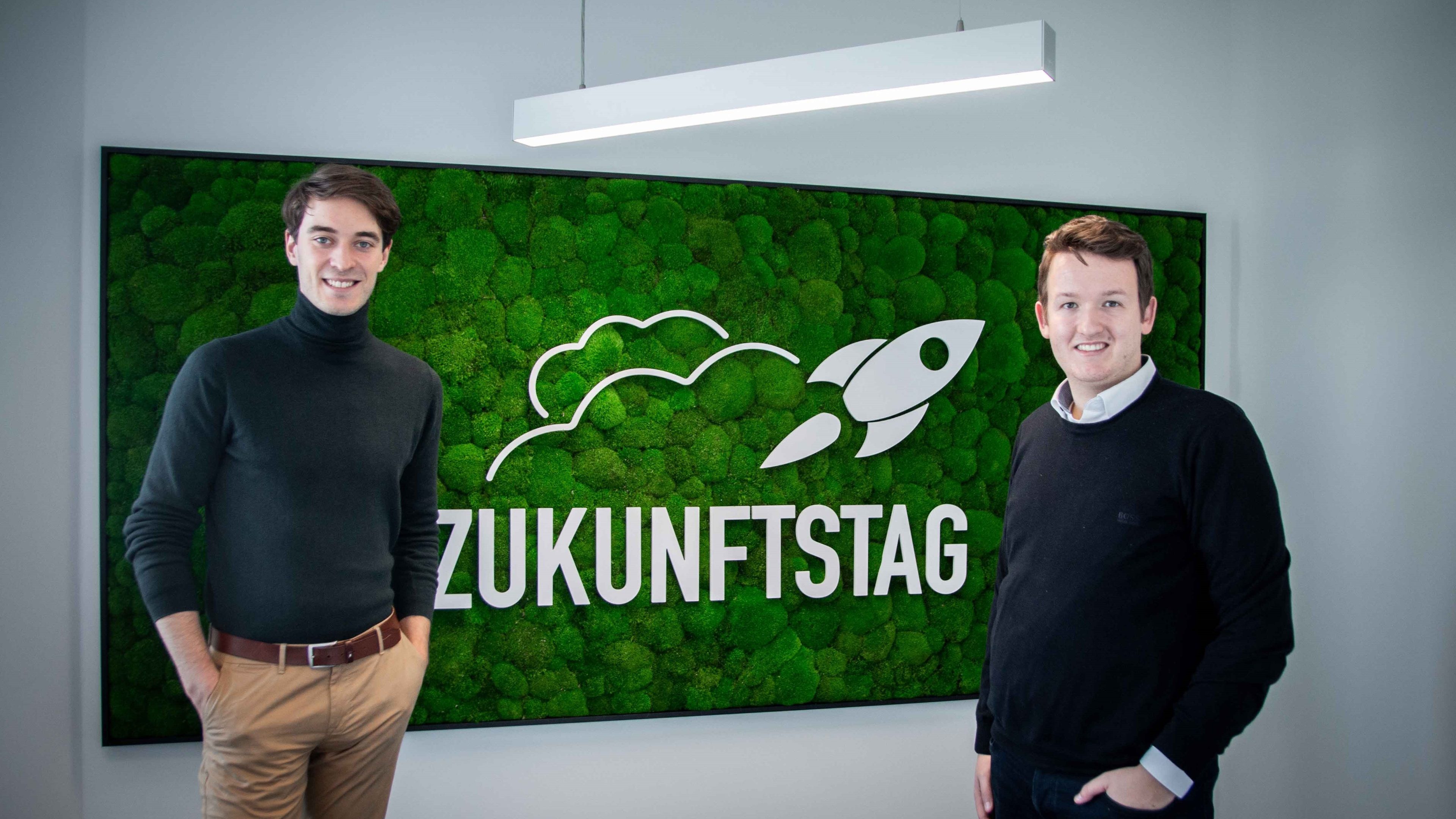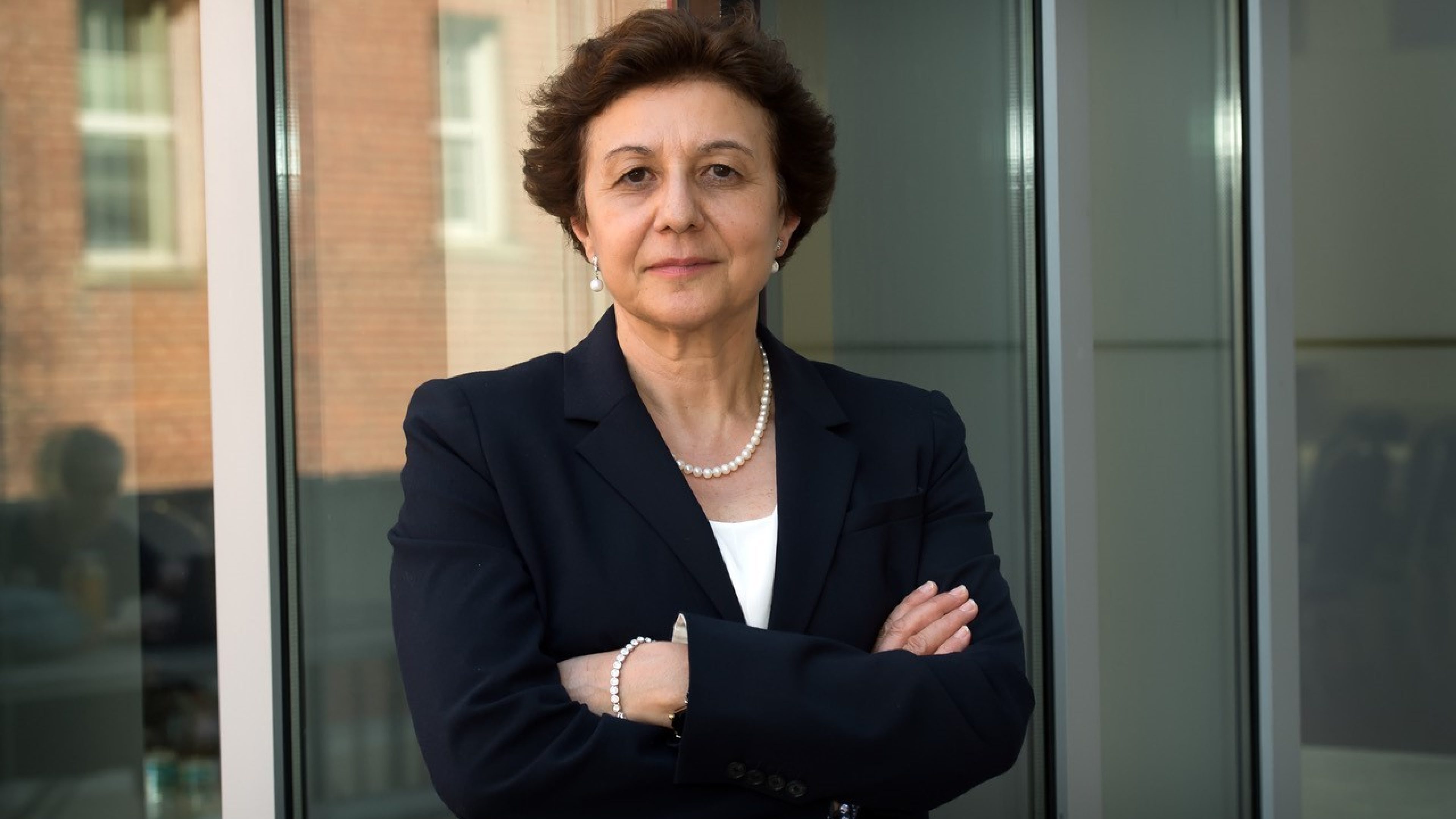Lorenzo Wienecke and Juri Galkin explain the world of finance to young people. How did they end up teaching this subject? How can 16-year-olds be empowered to make self-determined financial decisions? And how do you motivate schoolchildren to save for old age?
Since 2019, you have been organising events called “Future Days” at schools – one-day crash courses on taxes, finance, health insurance and your first apartment. Shouldn’t schools be teaching this already?
Galkin: Of course. But the fact is that it’s not happening. Economics and money are hardly dealt with at school or aren’t even addressed at all. The latest Schufa study showed that three quarters of all young adults between the ages of 16 and 25 in Germany have not learnt anything about finance at all. And 93% would like to have more financial literacy education in school. The situation is similar in other European countries.
How did you come up with the idea to remedy this situation?
Wienecke: The trigger was the viral tweet in 2015 by a high school student who wrote: “I’m almost 18 and don’t know anything about taxes, rent or insurance. But I can write a poem analysis. In 4 languages.” It launched a broad discussion about the usefulness of what is taught in schools. Two years later, Lorenzo and I met at a party. We decided to do something to remedy the situation and developed the idea of Future Day. Our society should finally start talking about money.

Shouldn’t parents just discuss money more with their children?
Galkin: The reality is that many parents also have little or no financial knowledge. My mother, for example, raised three children as a single parent and cook. She could show me how to make the best carbonara but not the best way to plan for retirement or how to complete my tax return.
Wienecke: Leaving financial education solely to parents reinforces existing social disparities. But financial knowledge is an important tool for success in life, so acquiring this knowledge must not depend on luck or chance. Just like we learn basic maths or German at school, basic knowledge of financial subjects should also be taught.
Were you welcomed by the schools with open arms?
Galkin: Not at all. Extra-curricular economic education was seen as toxic. Ideas of this kind were regarded as a Trojan horse – an attempt by companies to place their products or services in schools. The school administration was therefore highly sceptical. In our hometown of Kassel, we presented our concept at all 17 upper secondary schools and were rejected by all of them. It took a whole year before a headmaster dared to give us a chance. Our big advantage is that we are an independent non-profit organisation.
In the meantime, you’ve been on the road not only in Germany, but in Austria and Switzerland as well. In 2023 alone, you reached 50’000 pupils. Have you boosted their financial confidence?
Wienecke: We find that young people are very interested but also very insecure. They are uncertain about their own financial future, especially in view of inflation, and because they feel unprepared for adulthood when it comes to financial matters. The biggest problem is feeling overwhelmed. People usually overestimate how complex financial issues actually are. They often think that they have to know a lot about the stock market and have to read the business news every day if they want to learn about the markets. It’s paralysing. Many young people feel like ladybirds trapped on their backs. But if you get them on their feet and show them how to crawl step by step, it’s not that hard at all. That’s what we’re trying to do with our crash courses.

How does this work in practice?
Wienecke: Most young people see a pay slip for the first time when they have their first job and a rental contract for their first apartment. They don’t know about taxes, insurance, saving or investing. We teach young people practical knowledge rather than just theory – being as specific as possible and keeping things playful and relevant to their lives. We try to convey to them not to be afraid of money issues. Financial knowledge affords you more self-determination.
Where do you sense the greatest need for information?
Galkin: Going into debt, for one. We often learn about tragic fates in our line of work. As soon as they turn 18, a lot of young people have already signed a mobile phone contract and ordered a lot of stuff on invoice, piling up enormous debt in no time. That’s why we’re trying to educate them about “buy now, pay later” plans that are becoming more and more common. However, the biggest knowledge gaps concern the capital market.
In what sense?
Wienecke: Two opposing trends are evident here, both of which jeopardise young people’s financial future: gambling or total refusal to participate. Popular trading apps like Trade Republic or Robinhood make it easy for them to trade stocks or speculate with cryptocurrencies on their smartphones. Many students are vulnerable to products that promise quick riches and are unaware of the risks they entail. We are trying to counteract this by showing how proper investment works and what speculation is.

And how do you deal with those who opt out entirely?
Galkin: We try to break down their preconceptions and irrational fears. In Germany, more than 80% of people do not invest in capital markets, and this scepticism spreads to young people. But we can’t afford not to participate, because if you want a decent pension, you need to think about retirement planning early on. By explaining to young people how investments work and educating them about equities and funds, we can make the most impact.
How can you convince young people to save for retirement? I don’t think there’s anything more alien to one’s attitude towards life at that age.
Wienecke: We start with their personal situation and say: think about how you would like to live when you’re old and what you would still like to do. Then we let them calculate what pension they can expect from the state if they work their whole lives. In Germany, this is just above subsistence level. You can’t believe how surprised 16-year-olds are when they grasp this and compare it to their grandparents’ lifestyle. We then show them how essetal it is to save for retirement.

How do you do that?
Galkin: We explain why the critical factor for retirement provisions is the total duration and talk a lot about compound interest. This is the part that everyone enjoys the most, because the effect of compound interest is both understandable and fascinating. And finally, we show that it’s not that complicated to set up a savings plan and that you don’t have to be a millionaire to invest in stocks. 25 euros a month is enough. Once the trinity of “awareness, urgency and feasibility” reaches people, they start to save.
Your book “Dein Crashkurs fürs Leben” (“Your Crash Course for Life”) has just been published. What are your three most important messages for young people?
Galkin: Firstly, learn aboutputting your capital to work. In order to secure your retirement, you’re going to need to make more out of your money. Secondly, make sure you manage your money wisely! Spend only what you have. And thirdly, take action instead of complaining! Don’t let people tell you how much you can go wrong when investing, but be courageous and give it a try. Or to quote football coach Jürgen Klopp: “Have more desire for winning than fear of losing.”
Images: © IWJB gGmbH

Lorenzo Wienecke and Juri Galkin
Lorenzo Wienecke (27) and Juri Galkin (25) founded the Initiative für wirtschaftliche Jugendbildung (Initiative for Economic Youth Education) and launched the Future Day programme in 2019, a day-long course dedicated to financial education in schools in Germany, Austria and Switzerland that prepares tens of thousands of young people every year for the start of adult life. They also talk to successful managers about career paths in their “Young Economist” podcast. Recently, their book “Dein Crashkurs fürs Leben. Alles, was du über Finanzen, Versicherungen, Steuern und Miete wissen solltest” was published by FinanzBuch Verlag to educate the younger generation on finances, insurance, taxes and rent.





